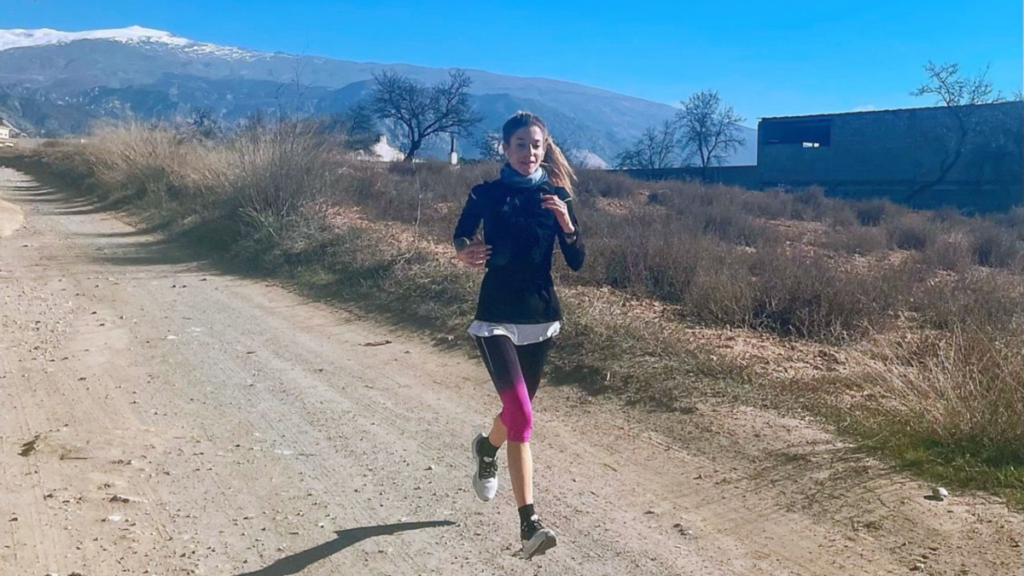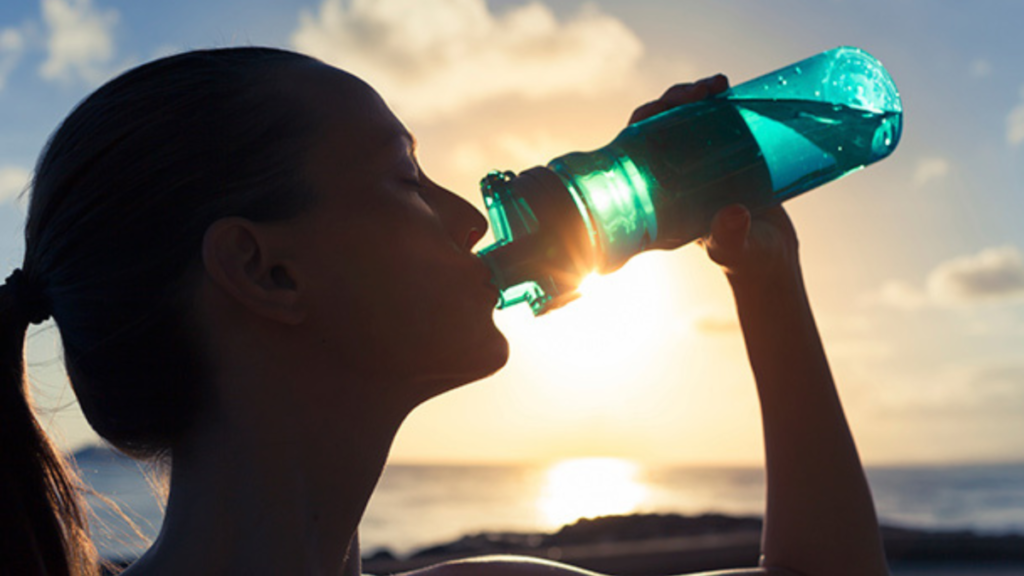
I’ve noticed that I tend to suffer from a dry mouth after a layoff from running and trying to get back into fitness. It seems somewhat ironic that when I was racing middle distance on the track we’d do our main 2-hour training sessions in the direct sun on 95-degree days and I can’t remember my mouth getting dry. Have I just gotten soft in my old age?
The act of running triggers an increased respiration rate leading to a higher volume of air passing through the mouth. This increased airflow can result in a drying effect on the oral mucosa, exacerbating the sensation of dryness.
Let’s take a closer look at why we get a dry mouth when we run as well as how to prevent it from happening in the future.
Why Does My Mouth Get Dry While Running
During exercise, the physiological reasons behind dry mouth are multifaceted. The act of running triggers increased respiration rate and changes in breathing patterns, leading to a higher volume of air passing through the mouth. This increased airflow can result in a drying effect on the oral mucosa, exacerbating the sensation of dryness. Additionally, the body’s focus on delivering oxygen to working muscles may divert resources away from saliva production, further contributing to dry mouth during physical activity.
The combination of these factors – heightened respiration, altered breathing patterns, and reduced saliva production – creates the perfect storm for experiencing dry mouth while running. Understanding how these physiological processes interplay can help individuals better manage and alleviate this common discomfort during exercise. Implementing strategies to maintain hydration levels, such as drinking water before, during, and after running, can help mitigate the impact of dry mouth and promote overall oral health. By being mindful of these physiological mechanisms, individuals can take proactive steps to address dry mouth and enhance their running experience.
Role of Dehydration in Dry Mouth
Dehydration plays a crucial role in the occurrence of dry mouth during physical activity. When the body lacks an adequate amount of water, it can directly impact saliva production. Saliva acts as a natural lubricant for the mouth, helping to maintain moisture and prevent dryness. However, when dehydration sets in, the body prioritizes essential functions over saliva production, leading to a decrease in saliva flow. This reduction in saliva can exacerbate the sensation of dry mouth, especially during activities like running that already increase airflow through the mouth.
To combat the effects of dehydration on saliva production and dry mouth, it is essential to prioritize hydration. Before embarking on a run, ensuring proper hydration by drinking water is key. During the activity, taking regular sips of water can help maintain fluid levels and support saliva production. After running, replenishing lost fluids is crucial to rehydrate the body and promote saliva flow. By staying hydrated before, during, and after physical activity, individuals can help mitigate the impact of dehydration on saliva production, reducing the likelihood of experiencing dry mouth while running.
Effect of Mouth Breathing
Mouth breathing during running can exacerbate dry mouth due to the increased airflow passing over the oral cavity. Unlike nasal breathing, which helps humidify and filter the air before it reaches the lungs, mouth breathing allows for direct exposure of the mouth to the dry, unfiltered air. This can lead to a quicker evaporation of saliva, contributing to the sensation of dryness in the mouth.
To counteract the effects of mouth breathing on dry mouth, individuals can benefit from incorporating techniques to promote nasal breathing during physical activity. Nasal breathing helps to warm, humidify, and filter the air, reducing the likelihood of dryness in the mouth. Techniques such as focusing on breathing through the nose, using nasal strips to improve airflow, and practicing breathing exercises to strengthen nasal breathing can all help maintain moisture in the mouth while running.

By understanding the impact of mouth breathing on dry mouth and implementing strategies to encourage nasal breathing, individuals can potentially reduce the discomfort associated with dryness during exercise. Prioritizing nasal breathing can not only help alleviate dry mouth but also optimize respiratory efficiency during running.
Medications and Dry Mouth
Medications can play a significant role in causing dry mouth during exercise. Certain medications, such as antihistamines, decongestants, and medications for high blood pressure, can have side effects that include dry mouth. These medications work by blocking certain receptors in the body, which can inadvertently reduce saliva production, leading to dryness in the mouth.
Individuals who experience dry mouth as a side effect of their medications should consult their healthcare provider to discuss potential alternatives or coping strategies. In some cases, adjusting the dosage or switching to a different medication with fewer side effects on saliva production may help alleviate dry mouth symptoms during exercise.
Moreover, staying hydrated and using sugar-free gum or lozenges can help stimulate saliva production and alleviate dry mouth discomfort while running. It’s essential for individuals taking medications that contribute to dry mouth to be proactive in managing their symptoms to ensure optimal comfort and performance during physical activity.
Influence of Environmental Factors
Environmental factors play a crucial role in exacerbating dry mouth while running. Low humidity and high temperatures can significantly contribute to increased dryness in the mouth during physical activity. When the air is dry, the body loses moisture more rapidly through respiration, leading to a parched sensation in the mouth and throat. Running in hot weather can also intensify dehydration, further worsening dry mouth symptoms.
To minimize the impact of environmental factors on dry mouth, runners can consider adjusting their running routes and timing. Choosing routes with higher humidity levels or running during cooler parts of the day can help reduce the risk of experiencing severe dry mouth. Additionally, staying well-hydrated before, during, and after running is essential to combat the effects of environmental conditions on saliva production.
By being mindful of environmental factors and making strategic adjustments to their running routine, individuals can better manage dry mouth symptoms and enhance their overall running experience.
Impact of Intense Exercise
Analyzing the impact of intense exercise on saliva production and mucous membranes reveals significant insights into the relationship between physical exertion and dry mouth symptoms. During prolonged or strenuous workouts, the body’s demand for oxygen increases, leading to more rapid and deeper breathing. This heightened respiratory rate can result in greater moisture loss through respiration, contributing to a dry sensation in the mouth and throat. Additionally, intense exercise can trigger the body’s stress response, further exacerbating dry mouth symptoms.
Moreover, the act of breathing through the mouth during intense physical activity can bypass the natural humidifying and filtering functions of the nasal passages, leading to increased dryness in the oral cavity. The combination of increased breathing rate, stress response, and mouth breathing during intense exercise can collectively contribute to a pronounced feeling of dry mouth.
Understanding how intense exercise impacts saliva production and mucous membranes is crucial for athletes and fitness enthusiasts to effectively manage dry mouth symptoms during workouts. Implementing strategies to stay well-hydrated, including frequent water intake and electrolyte replenishment, can help mitigate the effects of intense exercise on oral dryness.
Nutritional Factors and Dry Mouth
Considering the impact of diet on managing dry mouth during running is essential. Proper hydration plays a crucial role in alleviating dry mouth symptoms. Maintaining adequate fluid intake before, during, and after exercise can help combat dehydration, a common trigger for dry mouth. Electrolyte balance is also key, as electrolytes like sodium and potassium aid in fluid retention and hydration.
In addition to fluids, consuming hydrating foods can further alleviate dry mouth. Foods with high water content, such as fruits like watermelon, oranges, and cucumbers, can help keep the mouth moist during physical activity. Including these hydrating foods in pre-workout snacks or post-exercise meals can contribute to overall hydration levels and reduce the sensation of dryness in the mouth.

By focusing on proper hydration, and electrolyte balance, and incorporating hydrating foods into your diet, you can effectively manage dry mouth symptoms while running. Making mindful choices about what you eat and drink can significantly impact your comfort and performance during exercise.
Oral Health and Dry Mouth
Maintaining good oral health practices is crucial for minimizing discomfort related to dry mouth during exercise. Proper oral hygiene can help alleviate dry mouth symptoms and improve overall oral health.
One key tip is to stay hydrated by drinking water regularly, as dehydration can exacerbate dry mouth. Additionally, practicing good oral hygiene habits such as brushing your teeth twice a day, flossing daily, and using mouthwash can help reduce the risk of dry mouth during physical activity.
Another important aspect is to visit your dentist regularly for check-ups and cleanings. Your dentist can identify any oral health issues that may contribute to dry mouth and provide personalized recommendations for managing it effectively.
Furthermore, using sugar-free gum or lozenges during exercise can stimulate saliva production and help keep your mouth moist. Avoiding tobacco products and excessive alcohol consumption can also benefit oral health and reduce the likelihood of experiencing dry mouth while running.
By prioritizing oral health through hydration, proper hygiene practices, dental visits, and healthy habits, you can significantly decrease the discomfort of dry mouth during exercise.
Stress and Dry Mouth
Stress can play a significant role in exacerbating dry mouth during physical activity. The connection between stress levels and oral health is well-documented, with increased stress often leading to a dry mouth sensation. When the body is under stress, it can trigger a decrease in saliva production, resulting in dryness in the mouth.
To combat stress-induced dry mouth while running, incorporating relaxation techniques and mindfulness practices can be beneficial. Techniques such as deep breathing exercises, progressive muscle relaxation, and meditation can help reduce stress levels and promote saliva flow. Mindfulness practices, such as focusing on the present moment and being aware of your body’s sensations, can also aid in alleviating stress-related dry mouth.
By incorporating these relaxation and mindfulness strategies into your routine, you can better manage stress levels and reduce the likelihood of experiencing dry mouth during physical activity. Prioritizing stress management alongside oral hygiene practices and hydration can contribute to a more comfortable and enjoyable running experience.
Effects of Caffeine and Alcohol
Caffeine and alcohol consumption can significantly impact dry mouth while running. Both substances have dehydrating effects on the body, leading to a reduction in saliva production and an increased sensation of dryness in the mouth. Caffeine is a diuretic that can cause increased urination, potentially leading to dehydration if not compensated with adequate fluid intake. Similarly, alcohol can also dehydrate the body, further exacerbating dry mouth symptoms during physical activity.
To mitigate the effects of caffeine and alcohol on dry mouth while running, it is essential to moderate intake and prioritize hydration. Opting for alternative beverages such as water, electrolyte-rich sports drinks, or herbal teas can support hydration levels and help combat dry mouth. Additionally, being mindful of consumption timing, especially before a run, can help minimize the dehydrating effects of caffeine and alcohol.
By being conscious of your caffeine and alcohol consumption, making informed choices about alternative beverages, and ensuring adequate hydration, you can reduce the likelihood of experiencing dry mouth while running and enhance your overall exercise performance.
Medical Conditions and Dry Mouth
Medical conditions can play a significant role in exacerbating dry mouth symptoms during exercise. Conditions such as Sjögren’s syndrome, diabetes, and allergies are known to contribute to dry mouth issues. Sjögren’s syndrome, an autoimmune disorder, affects the body’s ability to produce moisture, leading to dryness in the mouth and eyes. Diabetes, especially when uncontrolled, can also result in dry mouth due to increased blood sugar levels impacting saliva production. Allergies, particularly to certain medications or environmental factors, can further worsen dry mouth symptoms during physical activity.
If you suspect that an underlying medical condition is causing your dry mouth while running, it is crucial to seek medical advice for proper diagnosis and management. Consulting with healthcare professionals, such as your primary care physician or a specialist, can help identify the root cause of your dry mouth and develop tailored treatment strategies. Managing medical conditions effectively through medication, lifestyle adjustments, and regular monitoring can alleviate dry mouth symptoms and improve your overall well-being during exercise.
Preventing and Managing Dry Mouth
To prevent and manage dry mouth while running, it’s essential to adopt practical strategies that focus on hydration, breathing techniques, and lifestyle modifications.
Hydration is key to combating dry mouth during exercise. Ensure you drink an adequate amount of water before, during, and after your run to maintain proper saliva production and moisture in your mouth. Consider using electrolyte-enhanced drinks to replenish lost minerals and maintain hydration levels.
Incorporating proper breathing exercises can also help alleviate dry mouth symptoms. Practice breathing through your nose to humidify the air before it reaches your mouth, reducing the likelihood of dryness. Additionally, focus on breathing deeply and rhythmically to promote optimal oxygen intake and minimize mouth breathing.
Making lifestyle adjustments such as avoiding caffeine and alcohol before running can also contribute to managing dry mouth. These substances can dehydrate the body, exacerbating dry mouth symptoms. Prioritize a balanced diet rich in hydrating foods like fruits and vegetables to support overall hydration levels.
By implementing these tips and strategies consistently, you can effectively prevent and manage dry mouth while running, ensuring a more comfortable and enjoyable exercise experience.
